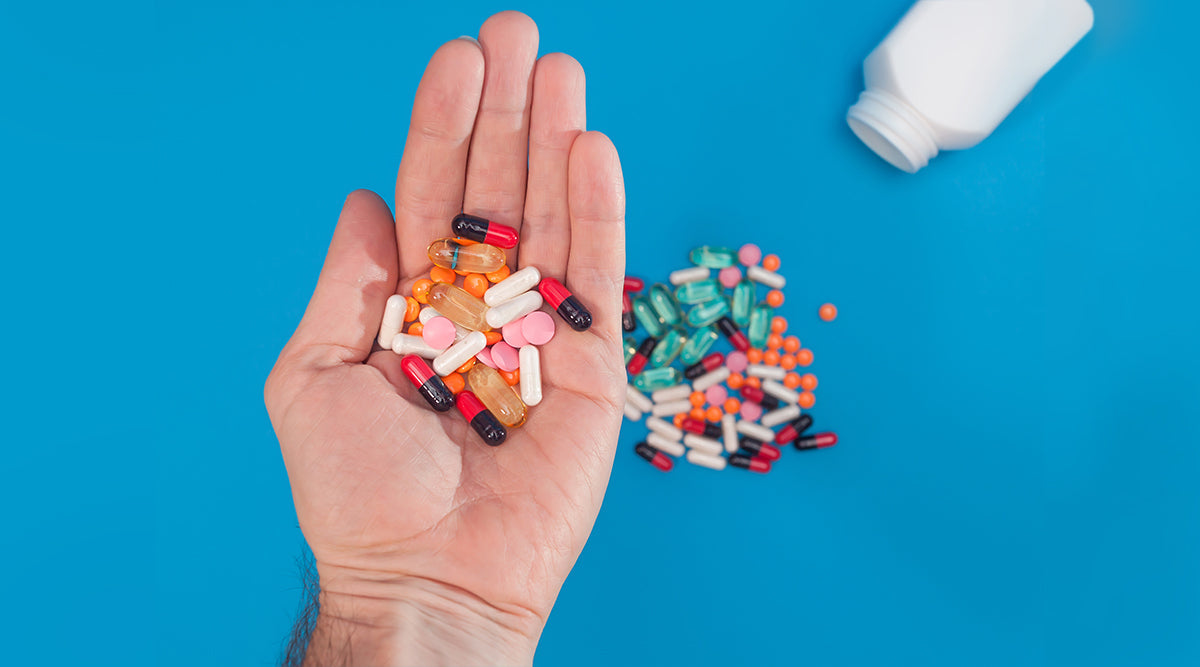How It Works Mobile
Health Benefits Mobile

Premature Ejaculation Pills - Do They Work?
Premature Ejaculation Pills - Do They Work?
11 min read
11 min read
Premature ejaculation pills are common in the market, but their effectiveness varies greatly—some men benefit, while for many they fall short. The article walks you through what’s behind these pills and how to figure out what might work for you.
Premature ejaculation pills: do they work? Well, yes and no. It turns out there isn't a single easy answer because not all premature ejaculation (PE) is the same, and not all men are the same. What works for one man may be ineffective for another. In this article, we break down the causes of PE, the available treatments, and the best way to find the treatment that works for you. Interested? Read on!
Walk down the street and take note of the men you see. Count them. Reach ten? Then you've likely seen at least one of the 3 out of every 10 men who suffer the ego-crushing embarrassment of premature ejaculation (PE). What you may not have seen is the other person affected by this stressful and challenging condition: his sexual partner.
Given how prevalent PE is, Big Pharma prescription medication has understandably stepped up to the plate in a big way, pumping considerable resources into the research and development of premature ejaculation pills. This has led to a market awash, with countless players claiming to treat PE with a little pill.
But do these premature ejaculation pills work? Can you trust any of these brands that slap a sticker on a bottle of pills and claim they can make your sex life better?
Let's start by gaining an understanding of the problem itself.
What is Premature Ejaculation?

Premature ejaculation is a kind of sexual dysfunction where a man regularly reaches sexual climax quicker than intended. This can occasionally happen to anyone, but if you consistently ejaculate during sexual intercourse within a minute or so of penetration, chances are high that you might be suffering from premature ejaculation.
How can you differentiate between an off night and key symptoms of premature ejaculation? The answer lies in an understanding of the mechanics of sexual satisfaction and how ejaculation occurs.
How Does Ejaculation Work, Anyway?

We're all familiar with ejaculation, thanks to either our efforts or a partner. But did you know that this critical moment of bliss doesn't just happen in one go? Behind the scenes, there's a well-choreographed process to deliver those few mind-blowing seconds. As you approach climax, your nerves, brain, and muscles conduct an orchestra in two phases: emission and ejaculation.
In the emission phase, the brain instructs the smooth muscles in and around the epididymis in your testicles and vas deferens to contract, forcing sperm up towards the base of your penis and into the urethra. They mix with other fluids in the surrounding prostate gland and seminal vesicles to form semen.
The second stage, ejaculation, involves the rhythmic contraction of your pelvic muscles that force the semen further along the urethra, adding more fluids from the Cowper's gland to increase the volume. As the muscles at the base of your penis contract, they expel this mixture out of the urethra in several spurts.
If all goes well, this entire process will only happen after sufficient sexual stimulation. Unfortunately, for some men, this time to ejaculation is shorter than they or their partners would like.
But why does this happen?
What Causes Premature Ejaculation?
Many factors can cause premature ejaculation. A small number of men are born with this condition, known as lifelong (primary) premature ejaculation. Most reported cases, however, come from men who develop acquired (secondary) premature ejaculation later in life. Two other groups of men might think they have experienced premature ejaculation when, in fact, they haven't. Either they have suffered a one-off (natural variable PE), or they have fallen short of some personal or societal standard for an "ideal" ejaculation time (subjective PE).
We'll focus on the primary and secondary causes of premature ejaculation.
Primary PE
Men who suffer from this form of PE have never had a standard ejaculation time since becoming sexually active. This can be caused by:
1. Genetic Issues
Some of us drew a bad hand when we were conceived in the form of a gene that interferes with the brain's role in the orgasm and ejaculation process. This gene leaves men with faulty receptors for the neurotransmitters that the brain requires for sexual desire-related functions.
Speaking of neurotransmitters...
2. Low Serotonin Levels
The brain chemical serotonin plays a key role in delaying ejaculation during sexual activity. When serotonin levels are low, you're more likely to experience premature ejaculation.
Yet some men who previously enjoyed regular orgasms and ejaculation in sexual encounters run into issues later, an acquired PE.
Secondary PE
Both Biological factors and psychological factors can contribute to Secondary PE.
1. Overly Sensitive Nerves in the Penis
The head and tip of your penis have several nerves that contribute to physical arousal and pleasant sensations during sex. Stimulating these nerves during foreplay or intercourse can bring a man closer to orgasm and ejaculation, making overly sensitive nerves a risk factor for early ejaculation.
2. Performance Anxiety
The early stages of a sexual encounter can be anxiety-inducing for some men. Obsessing over how a partner views him or thoughts of inadequacy in size or experience can lead to fears about performance, ironically resulting in early ejaculation.
3. Rushed Masturbation Habits
While some take their time with self-pleasuring, for others, the goal of masturbation is simply to achieve sexual release as efficiently as possible. Many teens rush masturbation because they lack adequate privacy to take the time needed to fully explore themselves and become accustomed to ejaculating swiftly. This phenomenon carries over into penetrative sex.
4. Weak Pelvic Floor Muscles
Pelvic floor muscles play an integral role in the ejaculation process during intercourse. With some practice, men can learn to manipulate these muscles to delay ejaculation, resulting in intercourse that lasts longer and is more enjoyable for both parties. However, men with weak pelvic muscles find this level of control difficult, leading to unintentional early ejaculation.
5. Prostatitis (Prostate Gland Inflammation)
The prostate gland produces fluid that adds to the sperm and other gland secretions to form semen. In addition, the muscles surrounding the prostate play a central role in ejaculation itself. An inflamed prostate can interfere with the ejaculation process, resulting in PE.
6. Stress
Stress from life, be it work, relationship problems, or school, can hamper sexual function, causing premature ejaculation. Stress significantly affects levels of hormones and neurotransmitters in the brain, creating a cocktail of noradrenaline, cortisol, and serotonin that hampers the brain's ability to experience sexual enjoyment and control the processes of orgasm and ejaculation.
7. Depression
Similar to anxiety, depression can significantly alter the makeup of the brain chemicals, leading to an imbalance. These neurotransmitters and hormones play a crucial role in the early phases of sexual excitement. Consequently, when they’re out of sorts, a man can find it difficult to gauge how excited he is, leading to a shortened time of intercourse before ejaculation.
8. Erectile Dysfunction
Some men find it difficult to achieve or maintain an erection of sufficient strength. This adds pressure to rush sexual intercourse to achieve orgasm before erection problems arise.
9. Hormone Imbalance
Male sexual function is influenced heavily by hormones like thyroid stimulation hormone, oxytocin, luteinizing hormone, and prolactin. Good orgasm and ejaculation depend on a balance between these interdependent hormones. For example, heightened thyroid hormones (hyperthyroidism) can interfere with the levels and function of male sex hormones like testosterone. Thyroid issues can also cause depression and anxiety - all critical contributors to premature ejaculation and erectile dysfunction.
Treating Premature Ejaculation

The many possible causes for early climax may justify the sheer number of premature ejaculation treatments available. We do not recommend blindly trying every viable option to delay ejaculation, however. Instead, you need to assess your situation and speak to a medical professional about natural remedies and other medications or get a physical exam to determine what might be the most effective option for you to improve sexual performance.
It is important to note that obtaining a prescription treatment for certain medications is necessary, and healthcare providers play a crucial role in determining the appropriate treatments based on individual medical conditions.
Premature ejaculation treatment ranges from off-label prescription oral medications to guided behavioral techniques. Furthermore, there are a host of non-medical premature ejaculation pills that promise methods for treating PE. All of this begs one question…
Do Premature Ejaculation Pills Work?

Food and Drug Administration-approved medication, such as ED pills, are often prescribed off-label by doctors as PE treatment. The same applies to some antidepressants and painkillers, which frequently have the - in this case - helpful side effect of delaying orgasm.
Other treatments and over-the-counter pills are readily available online or in convenience stores as practical means of treating premature ejaculation. Although lacking FDA approval, there are many containing natural ingredients with favorable sexual health properties that have been long used by various cultures to treat premature ejaculation and other sexual problems. Furthermore, some of the individual active compounds in these herb-based pills are bioactive, meaning they affect critical bodily processes like blood flow and smooth muscle contraction, making them ideal for the treatment of premature ejaculation.
Still, remembering that what works for some men may not work for you is worth remembering. Finding the ideal remedy for your situation may require a few tries and patience.
Does Medication Work?
Despite the widespread condition, few official prescription medications are used to treat PE. Instead, most pharmacological treatments for premature ejaculation are on an off-label basis.
Examples of prescribed off-label PE treatment include:
1. Erectile Dysfunction Drugs (PDE-5 inhibitors)

Are you familiar with the little blue pills? Viagra (Sildenafil) is an example of a PDE5 inhibitor used to treat erectile dysfunction. However, the Food and Drug Administration (FDA) has not approved these drugs to treat premature ejaculation. Nevertheless, they have been successfully used in the off-label treatment of premature ejaculation. Remember the contracting smooth muscles in the epididymis and vas deferens from earlier? Studies suggest that PDE-5 inhibitors cause these muscles to relax, making them delay ejaculation. However, watch for adverse side effects like low blood pressure, nasal congestion, stomach upsets, and profuse sweating.
2. Certain Antidepressants (Selective Serotonin Reuptake Inhibitors)
Certain drugs like selective serotonin reuptake inhibitors (SSRIs) are used to treat depression and other psychological issues. Although approved by the FDA for treating depression, these medications can also serve as PE treatments because one of their side effects is delayed orgasm. It also helps that these SSRIs treat one of the psychological factors that can contribute to premature ejaculation.
Before going all-in on using certain antidepressants to treat premature ejaculation, however, you need to watch out for potential complications from the side effects, including decreased libido, dry mouth, nausea, and drowsiness.
3. Painkillers
Sometimes, doctors prescribe oral medication like tramadol to treat pain. However, this analgesic can also delay orgasm as a side effect. This is often used as a fallback option when the previously mentioned antidepressants prove ineffective. However, you should note that tramadol also brings with it a host of other side effects like drowsiness, headaches, and nausea.
Are There Any PE Drugs with No Side Effects?
Our bodies interact with medicines differently. So what works for another man might have the opposite effect on you entirely. Antidepressants, in particular, can be hit and miss. Often, you will need to try out several medications to find one to help delay ejaculation with minimal side effects.
The process can be lengthy and frustrating, and success is not guaranteed. Those who have bad results from prescription medications might find help from over-the-counter premature ejaculation pills and natural remedies.
How Premature Ejaculation Pills Work (and Some Natural Alternatives)
Premature ejaculation pills contain various natural ingredients to delay ejaculation. Several cultures, like Ayurvedic, have used herbal supplements to treat PE and other sexual ailments for thousands of years.
Here are some of the most common ingredients used:
1. St. John's Wort

This herb has many medical uses and is used to treat depression due to its influence on serotonin levels in the brain. You'll recall that antidepressants like selective serotonin reuptake inhibitors can be used as a treatment for premature ejaculation. A study found that St. John's Wort was relatively safe and effective in treating PE via the antidepressant route.
An Italian study further found that the herb does more than affect serotonin levels. St. John's Wort also affects how the vas deferens contract, placing the herb directly on the front line in the battle against premature ejaculation.
2. L-Citrulline

L-citrulline is an amino acid produced inside our bodies. In nature, it's usually found in watermelons. However, when it comes to improving sexual performance, citrulline has similar properties to the erectile dysfunction drugs discussed earlier: the PDE-5 inhibitors. This natural amino acid improves smooth muscle relaxation, delaying the ejaculation process. A Japanese study published in the Sexual Medicine journal demonstrated citrulline's ability to treat sexual dysfunctions, including PE.
The research showed that the natural compound could supplement other ED drugs in the PDE-5 inhibitor family.
3. Horny Goat Weed
The layman's term for this herb suggests its potency as a sexual performance enhancer. And just like Citrulline above, the active ingredient in horny goat weed functions similarly to ED drugs by enhancing smooth muscle relaxation, making it more challenging for the ejaculation process to kick off. Icariin, the active compound, also mimics male sex hormones, promoting sexual health in men.
Natural PE pills can help many men, but if you're not one of them, there are still other natural remedies available to remedy premature ejaculation.
Other Natural Remedies
When drug therapy falls short, other health practices can have surprisingly large effects.
These include:
1. Pelvic Floor Exercises

You can use your pelvic floor muscles to delay orgasm. This is because your pelvic floor muscles play a critical role in both the erection and ejaculation processes. Strengthening these muscles allows you to exert control over them during sex.
When you feel yourself approaching the point of ejaculation, squeezing the pelvic floor muscles can prevent premature ejaculation before it puts an early end to your sexual escapade. Renowned urologist Dr. Andrew Siegel refers to this as "short-circuiting the premature ejaculation."
He asserts, "With sufficient practice and the achievement of “muscle memory,” this process can become easier, and the problem of PE improved, particularly with a commitment to a pelvic floor muscle training program."
2. Pause-Squeeze Technique
The pause-squeeze technique is one of the most viable ways to control ejaculation in the heat of the moment. Pioneered by Masters and Johnson, this technique involves pulling out when you feel the moment of ejaculation around the corner.
Once out, squeeze the head of the penis until you feel yourself stepping back from the brink of orgasm. If you think you're ready to go back in, do so. This entire process gives you more control over your ejaculation, allowing you to experience climax only when you're ready.
3. Masturbation Before Sex
In some instances, men experience premature ejaculation because of over-excitement or anticipation of the act of sex itself. As a result, they don't pace themselves when engaging in intercourse, resulting in an early climax.
Masturbating without climaxing for an hour or so before jumping between the sheets with your partner can temper natural excitement, as well as decrease the penis's sensitivity, allowing you to go even longer as you build up to a satisfying climax.
4. Reduce Penis Sensitivity (Condoms, Lidocaine Cream, Sprays)

If your penis reacts to the slightest touch, you may need to reduce its sensitivity so that the pleasurable sensation won't be too fast, resulting in premature ejaculation.
You can reduce sensation in your penis by using thick condoms, numbing creams, gels, and/or sprays. Creams and sprays containing numbing agents like lidocaine are one particularly effective option. Apply the spray or cream 10 to 15 minutes before sex to dumb down the pleasurable sensation so that you can maintain control throughout intercourse.
Take care to use any numbing creams as instructed; it can cause a temporary loss of sensation and sexual pleasure for both partners, leading to unenjoyable vaginal sex.
5. Sex Therapy
As we touched on earlier, premature ejaculation is sometimes the result of a cocktail of psychological issues. Often, counseling is the quickest way to get to the bottom of these issues.
If you're in a steady relationship, you can visit a sex therapist as a couple. They're qualified to help you dissect your sexual history to identify the root of any early orgasm problems. In most instances, the therapist will also recommend some of the above remedies to accompany the therapy.
What is the Best Treatment for PE?

Because these treatment options aren't one-size-fits-all, you'll find that some work wonders for other men and not for you. Nevertheless, you can try non-standard prescribed PE meds or their natural alternatives. Your healthcare provider can also recommend combinations of the two. Alternatively, home remedies like the pause-squeeze technique provide a more hands-on approach to dealing with your premature ejaculation.
Ultimately, ensuring healthy sexual activity is an ongoing process that requires patience and time. Luckily, many men have persevered and made PE a thing of the past. The right approach is the one that works for you!
Disclaimer: This content is for informational purposes only and is not a substitute for professional medical advice. If you have questions or concerns, consult a qualified healthcare provider, such as a urologist or physician.
RELATED ARTICLES

The Ultimate Guide - How to Last Longer in Bed
20 min read

At What Age Does a Man Stop Ejaculating?
7 min read
Recent Articles
- 12 Types of Female Orgasms: How to Help Her Experience Each One
- Why I Recommend You Get a Tantric Couch
- The Downsides of Penis Enlargement Surgery: Risks and Alternatives
- Bathmate vs. Air Pumps
- Bathmate Results: Penis Pump Before & After
- Side Effects of Catuaba
- Health Benefits of Catuaba
- 12 Essential Tips for a Healthy Penis
- Can Quadriplegic Men Have Sex?
- Sexual Function for Men After Spinal Cord Injury






























